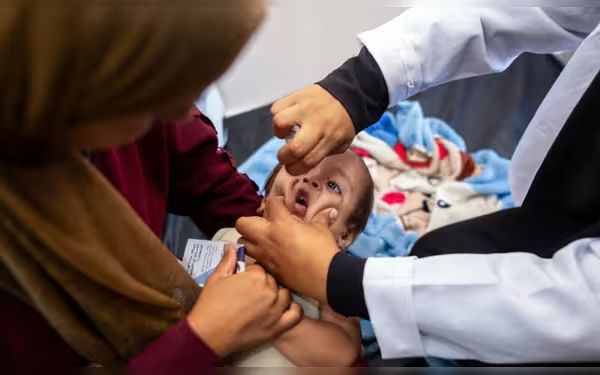Saturday, November 16, 2024 05:33 PM
Polio Vaccination Campaign Launches in Gaza Amid Ongoing Conflict
- First polio case in Gaza in 25 years reported.
- 640,000 children targeted for vaccination campaign.
- Health officials assure vaccine safety amid conflict.
 Image Credits: brecorder
Image Credits: brecorderA polio vaccination campaign has begun in Gaza following the first case in 25 years, targeting over 640,000 children amid ongoing conflict.
The ongoing conflict in Gaza has taken a severe toll on the region's health infrastructure, leading to alarming public health concerns. Recently, a health official announced the commencement of a polio vaccination campaign in Gaza, following the alarming report of the first polio case in 25 years. This initiative is crucial, especially considering the highly infectious nature of the poliovirus, which primarily affects children under the age of five.
Moussa Abed, the director of primary health care at the Gaza health ministry, confirmed that local health officials, in collaboration with the United Nations and various non-governmental organizations, have initiated the vaccination campaign in the central region of Gaza. The World Health Organization (WHO) has played a pivotal role in this effort, stating that Israel has agreed to implement a series of three-day “humanitarian pauses” to facilitate the vaccination process. Initially, the campaign was expected to start on Sunday, but it has now officially begun.
The vaccination campaign aims to administer two doses of the oral vaccine to over 640,000 children under the age of ten. After the initial phase in central Gaza, the campaign will extend to southern and northern regions. According to WHO deputy director-general Michael Ryan, a total of 1.26 million doses of the oral vaccine have already been delivered to Gaza, with an additional 400,000 doses expected to arrive soon.
In a concerning development earlier this month, the Ramallah-based Palestinian health ministry reported that tests conducted in Jordan confirmed the presence of polio in an unvaccinated 10-month-old baby from central Gaza. The poliovirus is primarily spread through contaminated water and sewage, a situation exacerbated by the ongoing conflict, which has severely impacted Gaza's sanitation and water supply systems.
Polio can lead to serious health complications, including paralysis and deformities, making the vaccination campaign even more critical. Parents like Bakr Deeb have expressed their initial hesitations regarding the vaccine's safety. However, after receiving assurances from health officials and witnessing other families participating in the vaccination drive, he decided to bring his three children for vaccination. “I was hesitant at first and very afraid of the safety of this vaccination,” he shared. “After the assurances of its safety, and with all the families going to the vaccination points, I decided to go with my children as well, to protect them.”
Abed emphasized the vaccine's safety, stating it is “100 percent safe.” This reassurance is vital in a region where fear and uncertainty often overshadow public health initiatives. The ongoing conflict, which escalated after Hamas's attack on southern Israel on October 7, has resulted in significant casualties and a humanitarian crisis, further complicating the health landscape in Gaza.
As the vaccination campaign unfolds, it is essential for the international community to support these efforts and ensure that children in Gaza receive the protection they desperately need. The situation remains dire, but with concerted efforts and community participation, there is hope for a healthier future for the children of Gaza. Vaccination is not just a personal choice; it is a collective responsibility that can safeguard the health of an entire generation.













